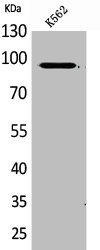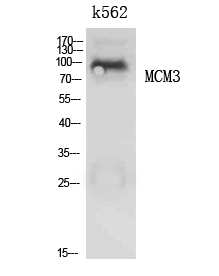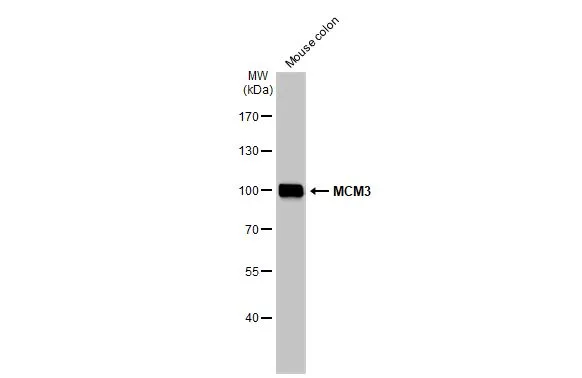![IHC-P analysis of human esophagus tissue using GTX04424 MCM3 antibody [MSVA-503M] HistoMAX?. Esophageal squamous epithelium with moderate to strong nuclear MCM3 staining of suprabasal and basal cells. IHC-P analysis of human esophagus tissue using GTX04424 MCM3 antibody [MSVA-503M] HistoMAX?. Esophageal squamous epithelium with moderate to strong nuclear MCM3 staining of suprabasal and basal cells.](https://www.genetex.com/upload/website/prouct_img/normal/GTX04424/GTX04424_20230728_IHC-P_73_23072722_307.webp)
IHC-P analysis of human esophagus tissue using GTX04424 MCM3 antibody [MSVA-503M] HistoMAX?. Esophageal squamous epithelium with moderate to strong nuclear MCM3 staining of suprabasal and basal cells.
MCM3 antibody [MSVA-503M] HistoMAX(tm)
GTX04424
ApplicationsImmunoHistoChemistry, ImmunoHistoChemistry Paraffin
Product group Antibodies
ReactivityHuman
TargetMCM3
Overview
- SupplierGeneTex
- Product NameMCM3 antibody [MSVA-503M] HistoMAX(tm)
- Delivery Days Customer9
- Application Supplier NoteIHC-P: 1:100-1:200. *Optimal dilutions/concentrations should be determined by the researcher.Not tested in other applications.
- ApplicationsImmunoHistoChemistry, ImmunoHistoChemistry Paraffin
- CertificationResearch Use Only
- ClonalityMonoclonal
- Clone IDMSVA-503M
- Concentration0.2 mg/ml
- ConjugateUnconjugated
- Gene ID4172
- Target nameMCM3
- Target descriptionminichromosome maintenance complex component 3
- Target synonymsHCC5, P1-MCM3, P1.h, RLFB, DNA replication licensing factor MCM3, DNA polymerase alpha holoenzyme-associated protein P1, DNA replication factor MCM3, MCM3 minichromosome maintenance deficient 3, RLF subunit beta, cervical cancer proto-oncogene 5, hRlf beta subunit, minichromosome maintenance deficient 3, p102, replication licensing factor, beta subunit
- HostMouse
- IsotypeIgG1
- Protein IDP25205
- Protein NameDNA replication licensing factor MCM3
- Scientific DescriptionThe protein encoded by this gene is one of the highly conserved mini-chromosome maintenance proteins (MCM) that are involved in the initiation of eukaryotic genome replication. The hexameric protein complex formed by MCM proteins is a key component of the pre-replication complex (pre_RC) and may be involved in the formation of replication forks and in the recruitment of other DNA replication related proteins. This protein is a subunit of the protein complex that consists of MCM2-7. It has been shown to interact directly with MCM5/CDC46. This protein also interacts with and is acetylated by MCM3AP, a chromatin-associated acetyltransferase. The acetylation of this protein inhibits the initiation of DNA replication and cell cycle progression. Several transcript variants encoding different isoforms have been found for this gene. [provided by RefSeq, Oct 2018]
- ReactivityHuman
- Storage Instruction-20°C or -80°C,2°C to 8°C
- UNSPSC41116161

![IHC-P analysis of human prostatic adenocarcinoma (PAC) tissue with (Gleason 3+3=6) tissue using GTX04424 MCM3 antibody [MSVA-503M] HistoMAX?. Prostatic adenocarcinoma (Gleason 3+3=6) with strong MCM3 positivity of few tumor cells. IHC-P analysis of human prostatic adenocarcinoma (PAC) tissue with (Gleason 3+3=6) tissue using GTX04424 MCM3 antibody [MSVA-503M] HistoMAX?. Prostatic adenocarcinoma (Gleason 3+3=6) with strong MCM3 positivity of few tumor cells.](https://www.genetex.com/upload/website/prouct_img/normal/GTX04424/GTX04424_20230728_IHC-P_203_23072722_685.webp)
![IHC-P analysis of human duodenum tissue using GTX04424 MCM3 antibody [MSVA-503M] HistoMAX?. A strong MCM3 immunostaining occurs in duodenal crypt cells. IHC-P analysis of human duodenum tissue using GTX04424 MCM3 antibody [MSVA-503M] HistoMAX?. A strong MCM3 immunostaining occurs in duodenal crypt cells.](https://www.genetex.com/upload/website/prouct_img/normal/GTX04424/GTX04424_20230728_IHC-P_333_23072723_614.webp)






